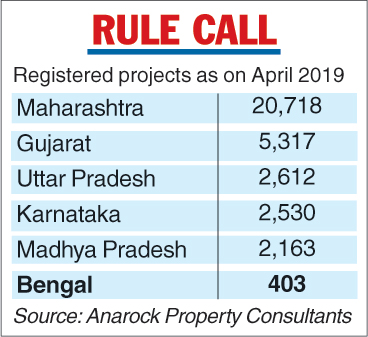Registrations of real estate projects and agents are on the rise across the country, albeit slowly, two years since a regulatory authority was set up to safeguard the interests of homebuyers.
Maharashtra is leading the pack among the Indian states in complying with the Real Estate Regulatory Authority (RERA), which was aimed at bringing transparency in real estate deals. A study conducted by consultancy firm Anarock suggests Gujarat, Madhya Pradesh and Uttar Pradesh have also done well in nudging developers to get the eligible projects registered and the agents, too.
Bengal, which joined the party much later partly because the government here was framing its own version of the regulation, has so far witnessed tepid response to the process.
At present, 22 states and six Union Territories have notified their RERA rules, of which 19 states have active online portals, the report said.
The model act, promulgated by the Centre in 2016, based on which states have framed their own set of rules and constituted the regulator, sought to protect homebuyers from several lapses among builders, especially delay in execution, faulty construction, retrospective changes in project profile without two-thirds consent and the funnelling of buyers’ payment to other projects.
The Real Estate (Regulation & Development) Act, 2016, had also proposed a hefty fine and even imprisonment for builders defaulting in fulfilling their obligations.
While framing their own rules, many states appeared to have diluted some of the provisions of the Act in favour of the builders. Bengal is not an exception, offering leeway to developers in meeting project deadlines.

Low awareness
A look at the Bengal number reveals that the registration figures do not speak highly of the level of awareness among builders and enforcement by the authority.
After coming into force from June 1, 2018, 403 projects have been registered with the West Bengal Housing Industry Regulatory Authority (WBHIRA). However, only three districts — Calcutta and the adjoining north and South 24 Parganas — accounted for 349 of those registrations.
Under section 3(1) of the West Bengal Housing Industry Regulation Act, 2017, all projects must be registered with the WBHIRA unless it has received the completion certificate, or has only eight apartments in all phases put together. Buildings coming up on land less than 500 square metres are also exempted to keep individuals out of the ambit.
If the developer fails to register a project despite being qualified, the Act stipulates 10 per cent of the project cost as fine. Evidently, the fear of fine is yet to sink in.
“It is unimaginable to think only 127 projects have been registered so far in Calcutta. Surely there are many more coming up but not avoiding HIRA,” a real estate participant said.
In North 24-Parganas 120 projects have been registered, while in South 24-Parganas 102 projects are registered. Howrah, which is separated from Calcutta by the Hooghly river, has only 16 projects registered.
Even though the Act empowers consumers to take errant builders to the authority, and vice-versa, no complaints appear to have been dealt with by the Bengal authority even though it has listed nine projects as defaulters.In contrast, Maha RERA has received as many as 6,631 complaints (as on April) since inception.
“Things are changing for the better. In several instances, developers have been reprimanded by the concerned authorities and have had to pay penalty to the buyers. While the redressal of complaints is not satisfactory for many, consumers are coming forward in large numbers to register complaints across states,” Aunj Puri, chairman of Anarock Property Consultants, said.










